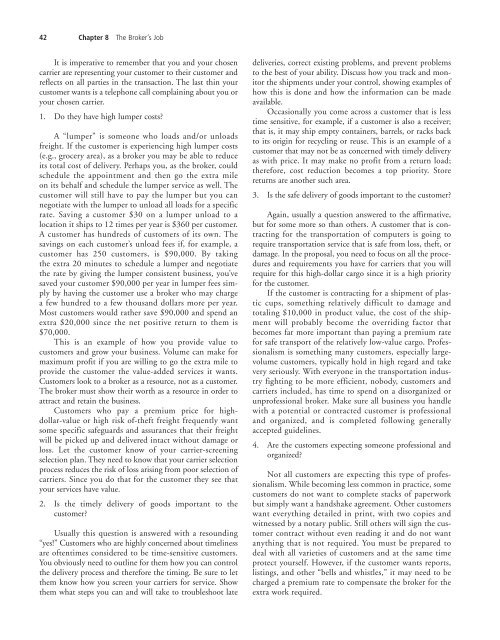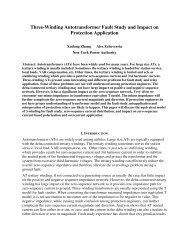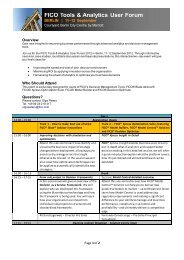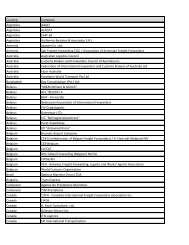TIA: Transportation Brokerage 101 Web Sampler
TIA: Transportation Brokerage 101 Web Sampler
TIA: Transportation Brokerage 101 Web Sampler
You also want an ePaper? Increase the reach of your titles
YUMPU automatically turns print PDFs into web optimized ePapers that Google loves.
42 Chapter 8 The Broker’s Job<br />
It is imperative to remember that you and your chosen<br />
carrier are representing your customer to their customer and<br />
reflects on all parties in the transaction. The last thin your<br />
customer wants is a telephone call complaining about you or<br />
your chosen carrier.<br />
1. Do they have high lumper costs?<br />
A “lumper” is someone who loads and/or unloads<br />
freight. If the customer is experiencing high lumper costs<br />
(e.g., grocery area), as a broker you may be able to reduce<br />
its total cost of delivery. Perhaps you, as the broker, could<br />
schedule the appointment and then go the extra mile<br />
on its behalf and schedule the lumper service as well. The<br />
customer will still have to pay the lumper but you can<br />
negotiate with the lumper to unload all loads for a specific<br />
rate. Saving a customer $30 on a lumper unload to a<br />
location it ships to 12 times per year is $360 per customer.<br />
A customer has hundreds of customers of its own. The<br />
savings on each customer’s unload fees if, for example, a<br />
customer has 250 customers, is $90,000. By taking<br />
the extra 20 minutes to schedule a lumper and negotiate<br />
the rate by giving the lumper consistent business, you’ve<br />
saved your customer $90,000 per year in lumper fees simply<br />
by having the customer use a broker who may charge<br />
a few hundred to a few thousand dollars more per year.<br />
Most customers would rather save $90,000 and spend an<br />
extra $20,000 since the net positive return to them is<br />
$70,000.<br />
This is an example of how you provide value to<br />
customers and grow your business. Volume can make for<br />
maximum profit if you are willing to go the extra mile to<br />
provide the customer the value-added services it wants.<br />
Customers look to a broker as a resource, not as a customer.<br />
The broker must show their worth as a resource in order to<br />
attract and retain the business.<br />
Customers who pay a premium price for highdollar-value<br />
or high risk of-theft freight frequently want<br />
some specific safeguards and assurances that their freight<br />
will be picked up and delivered intact without damage or<br />
loss. Let the customer know of your carrier-screening<br />
selection plan. They need to know that your carrier selection<br />
process reduces the risk of loss arising from poor selection of<br />
carriers. Since you do that for the customer they see that<br />
your services have value.<br />
2. Is the timely delivery of goods important to the<br />
customer?<br />
Usually this question is answered with a resounding<br />
“yes!” Customers who are highly concerned about timeliness<br />
are oftentimes considered to be time-sensitive customers.<br />
You obviously need to outline for them how you can control<br />
the delivery process and therefore the timing. Be sure to let<br />
them know how you screen your carriers for service. Show<br />
them what steps you can and will take to troubleshoot late<br />
deliveries, correct existing problems, and prevent problems<br />
to the best of your ability. Discuss how you track and monitor<br />
the shipments under your control, showing examples of<br />
how this is done and how the information can be made<br />
available.<br />
Occasionally you come across a customer that is less<br />
time sensitive, for example, if a customer is also a receiver;<br />
that is, it may ship empty containers, barrels, or racks back<br />
to its origin for recycling or reuse. This is an example of a<br />
customer that may not be as concerned with timely delivery<br />
as with price. It may make no profit from a return load;<br />
therefore, cost reduction becomes a top priority. Store<br />
returns are another such area.<br />
3. Is the safe delivery of goods important to the customer?<br />
Again, usually a question answered to the affirmative,<br />
but for some more so than others. A customer that is contracting<br />
for the transportation of computers is going to<br />
require transportation service that is safe from loss, theft, or<br />
damage. In the proposal, you need to focus on all the procedures<br />
and requirements you have for carriers that you will<br />
require for this high-dollar cargo since it is a high priority<br />
for the customer.<br />
If the customer is contracting for a shipment of plastic<br />
cups, something relatively difficult to damage and<br />
totaling $10,000 in product value, the cost of the shipment<br />
will probably become the overriding factor that<br />
becomes far more important than paying a premium rate<br />
for safe transport of the relatively low-value cargo. Professionalism<br />
is something many customers, especially largevolume<br />
customers, typically hold in high regard and take<br />
very seriously. With everyone in the transportation industry<br />
fighting to be more efficient, nobody, customers and<br />
carriers included, has time to spend on a disorganized or<br />
unprofessional broker. Make sure all business you handle<br />
with a potential or contracted customer is professional<br />
and organized, and is completed following generally<br />
accepted guidelines.<br />
4. Are the customers expecting someone professional and<br />
organized?<br />
Not all customers are expecting this type of professionalism.<br />
While becoming less common in practice, some<br />
customers do not want to complete stacks of paperwork<br />
but simply want a handshake agreement. Other customers<br />
want everything detailed in print, with two copies and<br />
witnessed by a notary public. Still others will sign the customer<br />
contract without even reading it and do not want<br />
anything that is not required. You must be prepared to<br />
deal with all varieties of customers and at the same time<br />
protect yourself. However, if the customer wants reports,<br />
listings, and other “bells and whistles,” it may need to be<br />
charged a premium rate to compensate the broker for the<br />
extra work required.















